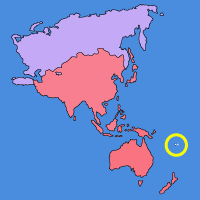Asia & the Pacific
Samoa

- © UNESCO/A. Rossi
The country hosts a UNESCO Cluster Office in Apia, which covers Australia, the Cook Islands, Fiji, Kiribati, the Marshall Islands, the Federal States of Micronesia, Nauru, New Zealand, Niue, Palau, Papua New Guinea, Samoa, the Solomon Islands, Tonga, Tuvalu and Vanuatu.
With climate change and the related sea level change becoming an increasingly important threat, Samoa is involved in several mitigation and monitoring projects. It is participating in a regional ocean monitoring network that aims to facilitate, encourage and widen data usage to develop enabling tools and services for better and sustainable use of ocean resources and ocean environment. It is also taking part in the Pacific Tsunami Warning and Mitigation System.
Below you can access the projects that are currently being implemented in the country within the framework of UNESCO’s Natural Sciences Sector.
Freshwater
- Hydrology for the Environment, Life and Policy (HELP) Pacific Programme More
People, Biodiversity and Ecology
- Asia-Pacific Co-operation for the Sustainable Use of Renewable Natural Resources in Biosphere Reserves and Similar Managed Areas (ASPACO)
Oceans
- Pacific Tsunami Warning and Mitigation System (ICG/PTWS)
- Pacific Islands Global Ocean Observing System (PI-GOOS)
Coasts and Small Islands
- Education for sustainable village living, Saanapu and Sataoa villages, Upolu Island More
- Youth Visioning for Island Living initiative:

